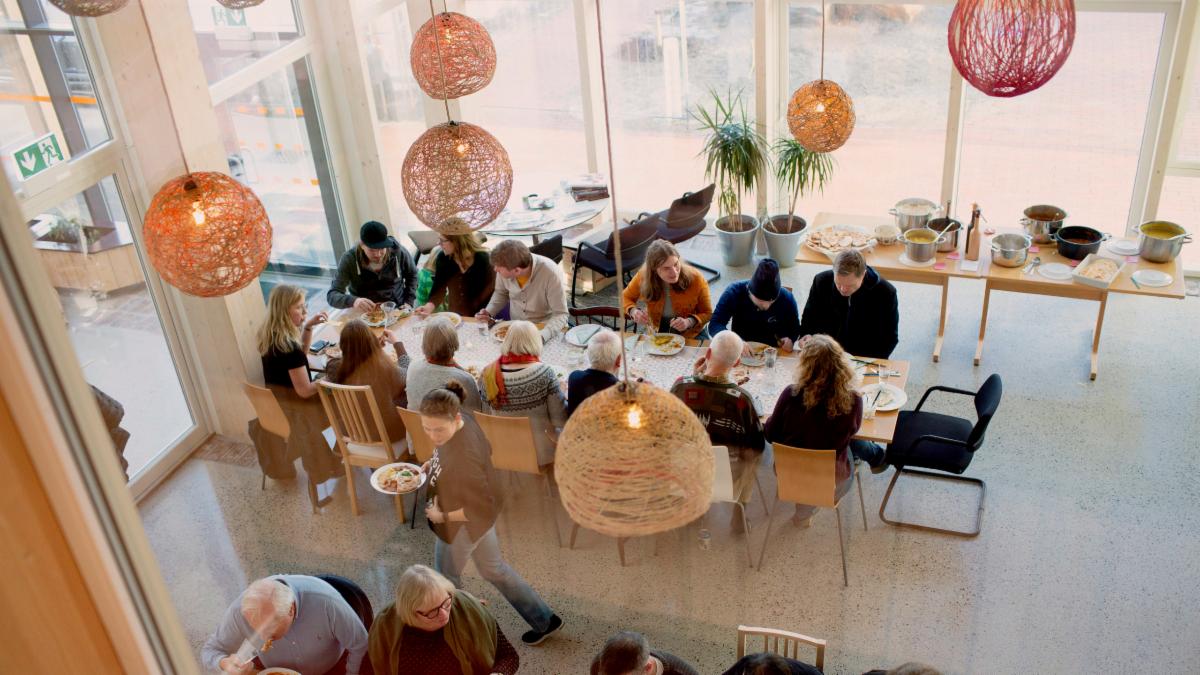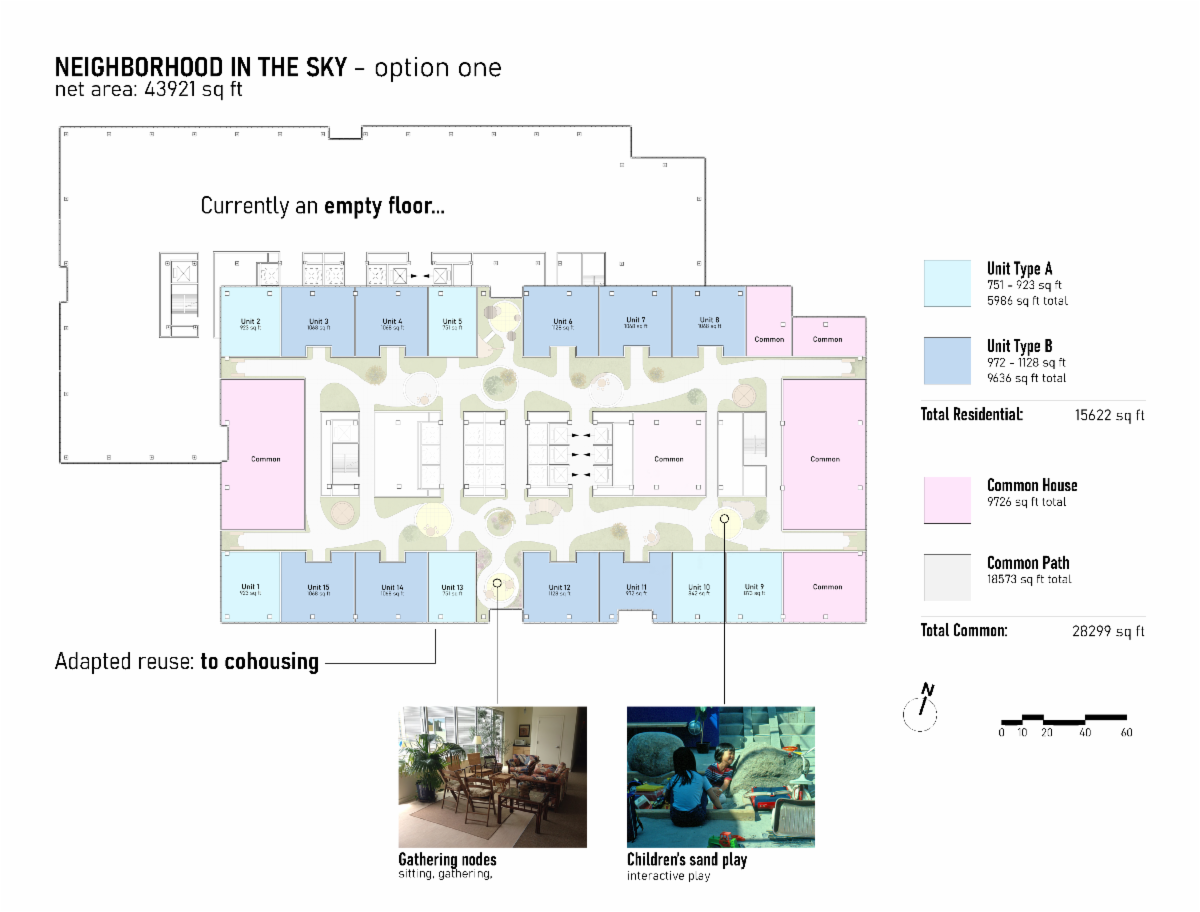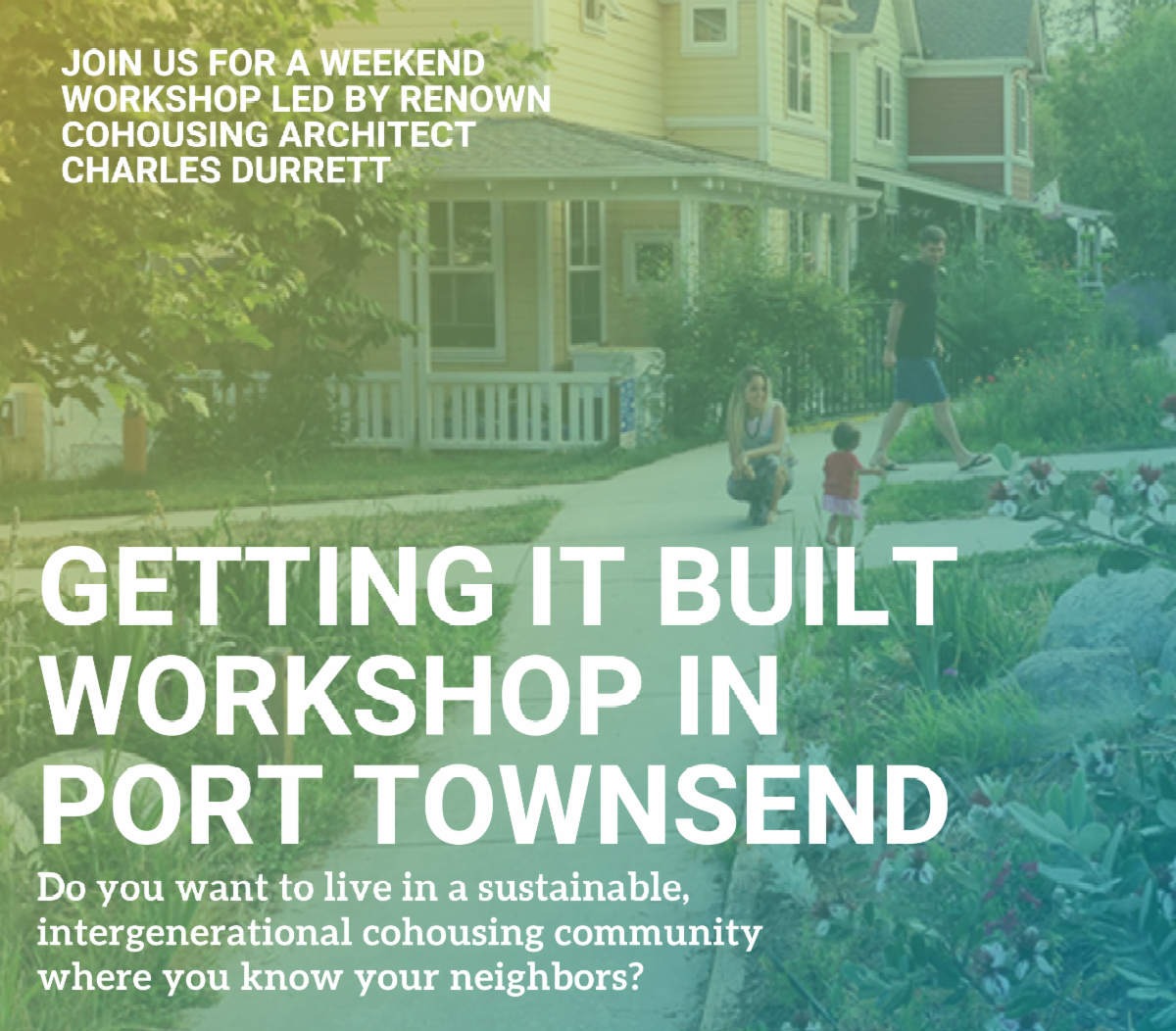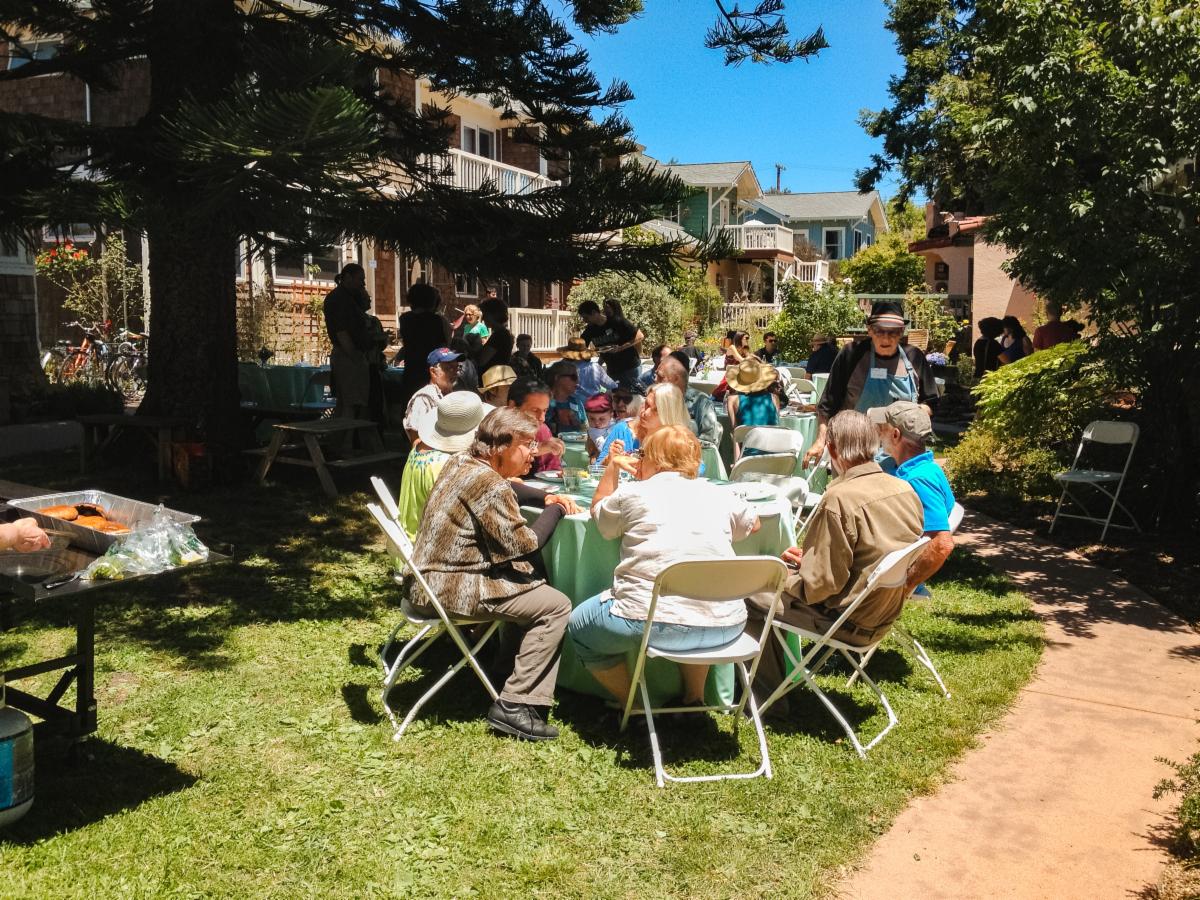|
The Cohousing Company
February 2024 Newsletter
| |
Neighborhoods in the Sky, AIA Monterey Talk, Antioch Classes, and More | |
The Cohousing's Company office fun and Nevada City Cohousing's Reconnecting | |
Neighborhoods in the Sky
Repurposing Vacant Office Buildings Downtown with Urban Cohousing
| |
|
The future of cohousing and the future of inner urban life design has to include the conversion of underutilized high-rise spaces to cohousing. Our firm has experience in repurposing empty office spaces, and I’m excited about the potential of revitalizing languishing big cities through inner urban cohousing communities. Cohousing groups will have a key role in repurposing vacant office buildings in downtowns.
Reports vary from 26% to 33% of high-rise square footage in San Francisco today falls below their highest and best use or stand empty. Seattle reports that 14% to 18% of floor area in high-rises are empty. That’s a lot of the constructed world sitting empty. Some of those spaces have been converted to childcare centers by our firm, about 20 altogether; we have repurposed high-rises over the years from San Francisco to Washington D.C.
| |
High rise repurposed for childcare | |
But the big miss is that those empty or underutilized spaces need to be converted to housing. The number of moms and dads walking, strolling, and driving to work in downtown San Francisco, Seattle, and other cities is way down. What’s needed now is affordable and market-rate housing downtown and lots of it. And carless housing, or shared-car housing has got to be the future of sustainability. We have found the shared electric car to be the game changer—everyone wants in on that.
There are long-term sustainability benefits to living in the city, like some will have no-car, car-light, or shared electric car living. Shared Teslas have made this even more popular…
From an ecological point of view, we need to get folks of all incomes able to live downtown in order to have more efficient lifestyles, buy less, consume less, share more, and reinvigorate downtowns, and to create real neighborhoods, which is possible even in a high rise. As an architect, I have found that of all of the housing types, cohousing tends to be the most comfortable with varied affordability in the same building and in the same community.
Sweden has been repurposing high-rises to housing, specifically cohousing since the 1980s. I’ve been to many of those neighborhoods in the sky, and they work great. (See photo of urban Swedish cohousing below).
|  | |
As the mega-leases of Google, Amazon, and others will be coming to a close soon, this turns into a real concern that we need to address head on. This can only be addressed by those who own high-rise buildings in downtowns, appreciate competent and appropriate design, and cohousing groups are the best at that - for one thing, it would be designed for and with a market.
Here is a proposition about that pending possibility. Redesigning these buildings to fit cohousing is easier than getting these high-rises to bend to any other use, because the shared common areas are the release valves for otherwise difficult interior adaptive reuse spaces. It allows for “fill in the gap” solutions that are not available to other uses—including larger bicycle storage in the windowless middle, a craft room, and common storage. And cohousing groups can get projects financed easier (because they are pre-sold or pre-leased), bring working capital to the table (their down payment), get projects approved easier (lots of allies at the podium), and get them largely if not entirely marketed themselves.
Many cities around the country are making public funds, financing and incentives available to developers (including cohousing groups) who make these conversions and include affordable units(1). Chicago (600 units); Pittsburgh; and Portland, Oregon adopted legislation in March, 2023 to name just a few. Cities like Chicago (who donated $197 million from locally collected property taxes) are starting to mitigate monoculture land-use. Mix it up a little bit.
(1) Evidence Matters, Fall 2023
|  | Potential for the adaptive reuse of empty office buildings into cohousing. | Childcare and play areas are possible in high-rise solution with thoughtful design | Another option for the adaptive reuse of empty office buildings into cohousing. | Common dining areas and gathering nodes provide spaces for neighbors to spend time together | |
Cohousing groups, if you know someone who owns a building downtown, forward this to them. If someone calls me from say Chicago who owns a high-rise, I, along with a couple of locals, will organize a presentation in that town. The first step of feasibility is determining if there are enough people interested in that town to pursue a project, assuming someone who comes forward. The agreements with building owners have to be clear, and iron clad to mitigate risk for everyone.
We have already been contracted by others and would be interested in taking on more projects along these lines. If you’re interested in talking more about this possibility, feel free to email me at charles.durrett@cohousingco.com or call my cell at (916) 716-6721 or my office at (530) 265-9980.
Looking forward to embarking on this very important additional chapter for cohousing!
Sincerely,
Charles Durrett
| |
Updates in Cohousing: Table of Contents
February 2024
|
-
Port Townsend GIB Workshop LOCATION CHANGE NOTICE
- Antioch Continuing Education Classes in Addressing Homelessness & Grassroots Organizing
- Monterey AIA Talks
-
Katharina Dress's Effective Communication for Living in Community Workshop
| |
Port Townsend GIB Workshop
LOCATION CHANGE NOTICE
Grassroots Organizing and How to Address Homelessness in Your Town
|  | |
CHANGE OF LOCATION NOTICE:
Art Building at Jefferson County Fairgrounds
4907 Landes St
Port Townsend, WA 98368
The new cohousing groups, Song Sparrow, Newt Crossing, and Puyallup Cohousing are coming together to put on a 2-Day Getting-It-Built Workshop on February 10–11, 2024 to start the process of creating these intergenerational cohousing communities.
This weekend workshop shares best practices and lessons learned throughout our over 35 years of experience, while also recognizing that each community is unique and each group needs to decide what approach makes the most sense for its specific location and situation. More cohousing communities have been started by the Getting-It-Built Workshop than by any other method in North America.
If you’re interested in attending, please contact Kate Nichols at katennichols@yahoo.com.
Please also feel free to download THIS FLYER for more detailed information and to share with your friends, family, and neighbors.
| |
Upcoming Antioch Continuing Education Classes
Grassroots Organizing and How to Address Homelessness in Your Town
| We are beyond excited to continue our collaboration with Antioch University Continuing Education Program in 2024. We will kick off the year with 2 amazing programs below! | | |
|
Antioch University 4-Session Continuing Education Class
How to Address Homelessness in Your Town
Four-part LIVE ONLINE Program
Fridays March 1, 8, 22, & 29, 2024
9am-11am (Pacific Time)
In this 4-week course, Durrett will impart his decades of experience so that you understand the dynamics of addressing homelessness in your community. This course is for legislators, non-profit staff, housing developers, municipal employees, architects, planners, designers, grassroots organizers, activists, urban volunteers, and all good citizens interested in taking action on this topic.
Sliding Scale/Scholarship/Pay it Forward Options are available. Please email CE Program Director, Ken Pienkos at kpienkos@antioch.edu for more information if you would like to receive or support scholarships.
Register Here & Spread the Word!
| | | |
|
Antioch University Special One-Time 3-Hour Workshop
Grassroots Organizing:
How to Get Your Cohousing Project Launched
Friday March 15, 2024
9AM (Pacific Time)/12PM (Eastern Time)
This course will mainly focus on the proven methods for grassroots organizing in creating cohousing communities, though other examples will be included as well. Grassroots Community Organizers are necessary out there, whether it is getting a new cohousing community built, or a new clinic, store, or a school made locally.
Register Here
| | |
AIA Monterey's Housing Series | |
Cohousing Communities: Designing for High-Functioning Neighborhoods
Date & Time: Tuesday, February 27, 6:00 P.M., Doors open at 5:30 p.m.
Location: SandBox Sand City, 440 Ortiz Avenue, Sand City
Cost: $10 AIA Members, Sponsors, Students; $30 General Public
Credits: 1.5 HSW, pending approval
Presenter: Charles Durrett, architect, author, and advocate of affordable, socially responsible and sustainable design.
Session Description:
In this session, you will learn from the leading architect and builder of cohousing globally. Durrett will impart his decades of experience so that you understand what cohousing is, how it’s designed, what its benefits are to the residents, and how it incorporates participatory design to promote more socially equitable and environmentally sustainable communities.
Go to Eventbrite to reserve your space.
| |
Effective Communication for Living in Community:
Transcending Differences with Understanding and Compassion
Workshop by Katharina Dress of Aging in Harmony
| |
|
A participatory workshop series
When: Wednesday, March 27, April 24, May 29, June 26, & July 31, 2024, 5 – 7 PM PT
Where: From the comfort of your home on Zoom
Facilitator: Katharina W. Dress, MA – Mediator, Facilitator, Conflict Coach, Trainer
Are you living in Cohousing, a Senior Community, or just share a home with housemates? Communication challenges can stand in the way of enjoying peace and harmony at home. Experienced Conflict Resolution Mediator and Trainer Katharina Dress invites you to join her for her new workshop series that will help you learn and practice how to transcend differences with understanding and compassion - together with others who also choose communal living.
For further information and to reserve your spot, visit:
https://www.eventbrite.com/e/effective-communication-for-living-in-community-registration-791677959087?aff=oddtdtcreator
|  | |
What others have said about Katharina’s trainings:
“I wanted to let you know that I have been thinking about many of the concepts you presented at your workshop. I appreciate the tools/perspectives you offered to help us create space for more empathetic conversations. I think the approach to problem solving which helps us listen more empathically is quite often the difference between conflict and low or no conflict. So I am sure the (workshop) experience will re-present itself in many future scenarios.”
- A Private Fiduciary from Contra Costa County, CA
“I came to Katharina’s Conflict Resolution workshop with no prior formal training in the field, although I had been a disputant using mediation services. I left with hands-on experience in simulated disputes, inspired and equipped with tools to guide my intuition on serving an aging population, in cohousing neighborhoods and beyond.”
-Raines Cohen, Community Organizer with Cohousing Coaches, Berkeley, CA
| | |
|
Katharina Dress, MA
Katharina W. Dress, MA, is a certified Mediator and Conflict Coach. As founder of AGING IN HARMONY (www.aginginharmony.com ) she helps older adults and their families, caregivers, and aging services providers to navigate challenging conversations about the later stages of life.
Katharina’s professional life and personal life were transformed in 2007, when she discovered Nonviolent Communication (NVC) and started training with John Kinyon and Ike Lasater, co-founders of MEDIATE YOUR LIFE (www.mediateyourlife.com).
For over 10 years, she assisted John and Ike in MEDIATE YOUR LIFE trainings in the U.S. and Europe. In order to share her experience and skills in NVC-based Compassionate Communication, Katharina also offers her own trainings and workshops throughout the U.S. and beyond.
| | |
|
Books have played a major role from the beginning in terms of getting cohousing to this country and built in your town, starting with our first book Cohousing: A Contemporary Approach to Housing Ourselves (The European Story). Bookstores normally play a key role in culture change in general, and cohousing is no exception.
Many groups have contacted the publisher (New Society Press and John Wiley & Sons, Inc.) directly to get bulk discounts, and I find that successful projects get started when lots of folks do this fun homework. I usually need to give a dozen copies of Creating Cohousing: Building Sustainable Communities, Senior Cohousing: A Community Approach to Independent Living and Cohousing Communities: Designing for High-Functioning Neighborhoods away to planners, banks, neighbors, mayors, new residents, local architects, builders, and so on—to give them context. It saves the group thousands and thousands of hours, dollars, and delays, and most importantly makes for a better project.
Cohousing is more than a sound bite; it is cultural pivot, and it takes folks doing some fun research first. Seattle and the surrounding areas have about a dozen cohousing communities today largely because the bookstores in town have sold more than 1,000 copies of Creating Cohousing: Building Sustainable Communities and the San Francisco area has over 20 cohousing communities largely because the book has sold more than 2,000 copies there.
|
| | | |